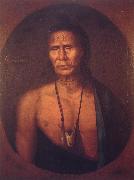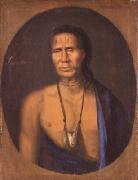Wholesale Oil Painting No Minimum |
|||||||||||
|
|
|||||||||||

|
|||||||||||
|
|
|
||||||||
Hesselius GustavusAmerican portrait painter. 1682-1755 He was trained in Sweden as a wood-engraver, gilder and painter. In 1712 he accompanied his brother, a Lutheran pastor, to America, where he settled in Philadelphia, PA. About 1720 he moved to the Annapolis, MD, area, returning before 1730 to Philadelphia, where he lived until his death. He was one of the first European-trained painters to settle permanently in America and introduced a greater technical skill and increased realism into Colonial painting. His painterly, atmospheric style, which derived from European Baroque, contrasted with the more linear technique of American-born painters. During most of his career he was the leading painter of the Middle Colonies. In addition to mythological scenes, altarpieces and portraits of prominent individuals, Hesselius undertook utilitarian work that included painting the country seat at Springettsbury of Thomas Penn (1702-75) and the interior of the Pennsylvania State House, as well as flower-boxes, |
||||||||
|
|
||||||||
Lapowinsa
Lapowinsa Painting ID:: 31938 |
mk77
1735
Oil on canvas
33x25in
mk77 1735 Oil on canvas 33x25in |
|||||||
|
|
||||||||
Gustavus Hesselius(1682 - May 25, 1755) was a Swedish born painter who emigrated to the New World in 1711. He was the father of painter John Hesselius and cousin of the religious leader Emanuel Swedenborg. Hesselius left his home country of Sweden for Wilmington, Delaware in 1711. There he lived until 1717 when he moved to Philadelphia, Pennsylvania, where he lived until 1721. In 1721, he moved to Prince George's County, Maryland and became a portrait painter, though he had been trained in Sweden. That same year, he received the first recorded public art commission in the American colonies, he painted The Last Supper. He also painted a Crucifixion. Some time around 1735, Hesselius returned to Philadelphia where spent the rest of his life and traveling. He was listed as a member of the Gloria Dei (Old Swedes') Church in Philadelphia. He also worked as an organ builder, having built an organ for the Moravian Church in Bethlehem, Pennsylvania in 1746. From about this time on, he focused on building organs, referring painting commissions to his son John. J. Hall Pleasants has said that Hesselius became "America's earliest portrait painter of note." In 1994 he was named to the Prince George's County Hall of Fame. |
||||||||
|
|
||||||||
|
|
Lapowinsa
Lapowinsa Painting ID:: 90441 |
1735
Medium oil on canvas
Dimensions 33 x 25 in (83.8 x 63.5 cm)
cyf 1735 Medium oil on canvas Dimensions 33 x 25 in (83.8 x 63.5 cm) cyf |
||||||
|
|
||||||||
|
Gustavus Hesselius (1682 - May 25, 1755) was a Swedish born painter who emigrated to the New World in 1711. He was the father of painter John Hesselius and cousin of the religious leader Emanuel Swedenborg. Hesselius left his home country of Sweden for Wilmington, Delaware in 1711. There he lived until 1717 when he moved to Philadelphia, Pennsylvania, where he lived until 1721. In 1721, he moved to Prince George's County, Maryland and became a portrait painter, though he had been trained in Sweden. That same year, he received the first recorded public art commission in the American colonies, he painted The Last Supper. He also painted a Crucifixion. Some time around 1735, Hesselius returned to Philadelphia where spent the rest of his life and traveling. He was listed as a member of the Gloria Dei (Old Swedes') Church in Philadelphia. He also worked as an organ builder, having built an organ for the Moravian Church in Bethlehem, Pennsylvania in 1746. From about this time on, he focused on building organs, referring painting commissions to his son John. J. Hall Pleasants has said that Hesselius became "America's earliest portrait painter of note." In 1994 he was named to the Prince George's County Hall of Fame. Lapowinsa 1735 Medium oil on canvas Dimensions 33 x 25 in (83.8 x 63.5 cm) cyf |
||||||||
|
|
||||||||
|
Prev Next
|
||||||||
|
|
||||||||
|
Related Paintings to Gustavus Hesselius :. |
||||||||
|
|
||||||||
|
CONTACT US |


